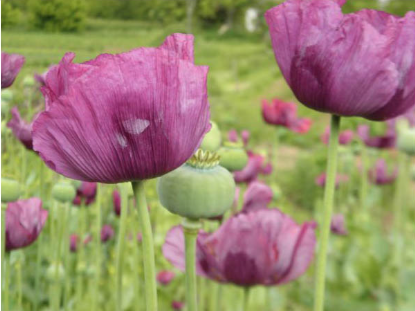Crop: Papaver somniferum L. (Seed poppy)
The landrace is cultivated for the seeds in Nagyszékely for several decades, the origin is not known (information collected from local elder people). It can be cultivated as winter and spring poppy as well, although autumn sowing usually gives a higher yield. As winter poppy it is sown by the 20th of September in a well-prepared seed bed. In the spring it needs thinning, the plants are flowering in May and the seedpods (capsules) are harvested in mid to end July. The landrace is somewhat heterogeneous, has medium to dark violet flowers, sometimes with a red shade and dark blue seeds.
Cultivation System: low-input, organic conditions.
Geographical Information
Country: Hungary
Nagyszékely landrace is cultivated in the village of Nagyszékely by several farmers mainly for own consumption and local market.
Farmer(s) description:
The landrace is cultivated by individual farmers, home gardeners on plots of 100-200 square meters. Farmers occasionally exchange propagation materials.
Propagation system: Seed, self-pollination
Multiplication procedures and consequences on landrace diversity:The farmers, gardeners used to save seeds, which is not a difficult process as poppy produces a huge amount of seeds and the crop is predominantly autogamous. Seeds are saved from healthy and good performing plants.
Management plan existence:The landrace management relies completely on farming activities within the area. Currently, no technical or scientific support is given. Accessions of ‘Nagyszékely’ poppy are kept under long terms storage conditions of Magház community seed bank, Hungary.
Added Values
The landrace is cultivated mainly for own consumption and a small proportion 10-20% is marketed directly.
Others (e.g. commercial/geographical brands or special traits):ND.
Magház, the Hungarian community seed bank is working on the on-farm conservation of the landrace since 2011.
Seeds are available via Magház network (www.maghaz.hu)
Case study prepared by The Hungarian Research Institute of Organic Agriculture (ÖMKi), Hungary.
ND.
